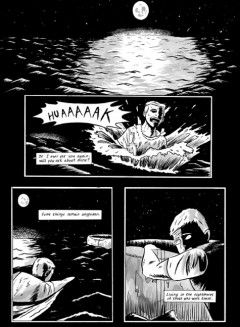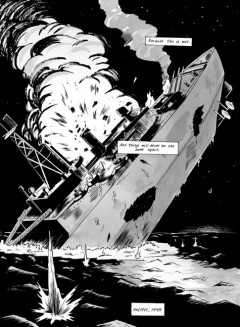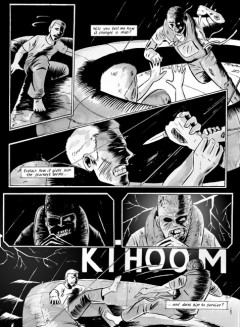“I think there’s room for lots more war comics as a whole, as long as you come at it from a unique enough angle” Dan Hill talks Go Home
 War comics were once a staple of the newsstand, and in recent years their popularity have dwindled. But that does not mean that they do not still have a relevancy. Writer Dan Hill takes a unique look at the horrors of war in the south pacific and the effects on those returning home in his new comic Go Home. We talk to Dan about why he feels war comics still have a place in today’s market.
War comics were once a staple of the newsstand, and in recent years their popularity have dwindled. But that does not mean that they do not still have a relevancy. Writer Dan Hill takes a unique look at the horrors of war in the south pacific and the effects on those returning home in his new comic Go Home. We talk to Dan about why he feels war comics still have a place in today’s market.

What made you choose to tell the story of Go Home, is it based on a true story?
DH: I have a penchant for stories exploring war. The subject fascinates and horrifies me in equal measure. There’s a book by Chris Hedges called ‘War is a Force That Gives Us Meaning’ where he explores that very notion. Reading that book was a partial influence on creating Go Home and certainly influenced the mindset of the main character, Husk.
It isn’t based on a true story, but the opening of the issue, and how Husk’s ship sinks, is partially based on the sinking of the USS Indianapolis. Also, of course, the notion of race in America during this time period is raised during the issue’s climax. Whilst not based on any specific case that kind of thinking was rampant up and down the West Coast of America during WW2.
Why choose World War Two rather than a more current conflict? Do you think there is a gap for a revival of WW2 stories or does it depend on the subject?
DH: It’s one I grew up reading and learning about. My Granddad was a great oral storyteller and he’d enthrall me with his explanations of elements of World War 2 history. I think the other reason I chose it is that it’s presented as one of the last ‘just’ conflicts, very much black and white. But, even amongst the Allies, there were shades of gray which perhaps aren’t really talked about, even today.
I think there’s room for more war comics as a whole, not just WW2, especially given the amount of conflict there has been since 2001, and the ever-changing face of war as it dovetails with modern tech. I’m greedy and biased when it comes to this question. There have been lots of *great* war comics the last few years. Anything by Garth Ennis of course, Graveyard of Empires, Nanjing Burning City, and Wolves of Summer.
Kathryn and Stuart Immonen did a really great experimental comic called Snipe, that whilst not strictly a war comic deals with a legendary sniper from WW2. Also, while again not a war comic, I think Ales Kot’s Zero is a fantastic study of what conflict and trauma can do to a person immersed in it over a prolonged period of time.
The short version of that answer is – I think there’s room for lots more war comics as a whole, as long as you come at it from a unique enough angle.

You have a quite unconventional narrative using a letter/diary voice-over rather than dialogue – why did you choose that and how did this help you develop the story?
Originally Go Home was completely silent save one line of dialogue. Another influence on the story was the Coen’s adaptation of James Dickey’s On The White Sea, which follows a WW2 airman stranded in Tokyo. There’s hardly anything in the way of dialogue in it.
However, I got a bunch of feedback that suggested whilst this was an interesting approach it made the comic read *incredibly* quickly. On top of that, I felt there was a bit of a disconnect between the reader and the ability to see some of Husk’s motivations in the story.
The opening scene hints at the conflict between Husk and his father, so I introduced the idea of Husk trying to explain his actions to his father in a letter as he was on the island. Andrew was for this idea and he executed it perfectly I think. As well as contributing tremendous, expressive art, his lettering gives Husk a whole other layer of characterisation.
You aren’t afraid of the horrors of war, and that is a huge part of the story, so how important was it for you to not soften the edges of this story?
DH: I think any story dealing with war that then shies away from the horror of it or glorifies violence in some way is missing the point. Some people find war gives them some kind of rush or purpose, and old men have exploited that notion since time began to send the young to die for a cause. The horrors of war are often hidden behind a lot of mythology and nationalism, so I think it’s important to bring them into the light.

How did you and Andrew come to work on this together? Is it your first collaboration?
DH: It’s our first collaboration. I’d seen Andrew’s work on Wolves of Summer, a great war comic that he’d done with writer Tony Keaton for Alterna. Whilst Wolves was mostly set during WW2 it had a setting and set of characters I hadn’t really seen before. Andrew’s art for it really captured my attention too. He has a great knack for selling a character’s emotion in a scene completely. The fervor, pain, and repulsion the characters go through seep off every page because of Andrew’s art.
Any time there’s a good war comic I usually shout about it online. Whilst yakking about it on Twitter I think Tony and/or Andrew tweeted back and we ended up chatting. When it came time to get an artist for Go Home, Andrew was a clear fit. I asked he accepted, and here we are!
Why choose to make it black and white?
DH: Firstly, I really love the way Andrew’s work looks in black and white. His linework and inks really pop on the page. Secondly, another influence was Askold Akishin’s comic, Snow, which plays with black and white in a really beautiful and effective way that left an impression. I also think that by putting the comic into black and white it gives the story a sense of distance, a kind of historical sheen that subconsciously suggests this is the past we’re seeing.
And finally what other books are you two working on and where else can we see your work?
Andrew is currently working on another book with Tony Keaton. After Wolves of Summer I can’t wait to see what they come up with next. His work can be found [here](http://andrewherbstart.com/) and he’s on Twitter at @and_droid_.
I’m currently getting art on another war book (surprise) called Disconnect with artist Gav Heryng. This focuses on drone warfare, PTSD and Rushkoff’s idea of ‘present shock’. I ended up interviewing and speaking with former drone pilot Brandon Bryant for background and research on that one so it’s something I can’t wait for people to see.
There’s also a good lineup of shorts I want to put out and then collect. Also Curriculum, the teen-focused, sci-fi comic I co-created with Ryan K Lindsay and Sami Kivela that has a whole bunch of other talented people involved should see the light of day sometime soon.
You can purchase Go Home from ComiXology for £1.49 and Dan can be found at @dan_hill on Twitter, on Tumblr and he’s also just started a newsletter too.



December 21, 2025 @ 2:39 am
Angenommen, du hast einen Bonusbetrag von 100€
erhalten und musst diesen 30 Mal vor der Auszahlung
umsetzen. Die geltenden Wettanforderungen und Umsatzbedingungen lassen sich am besten mit Blick auf ein Beispiel
verstehen. Sehr oft ist ein Echtgeld Bonus ohne Einzahlung mit einem Bonus Code verknüpft.
Es kann manchmal eine zeitliche Begrenzung geben, die mit einem erhaltenen Casino
Bonus ohne Einzahlung verbunden ist. Die Umsatzbedingungen schreiben Dir vor,
wie oft Du den Bonus ohne Einzahlung an den Slots umsetzen musst.
Diese beinhalten Willkommensboni, Freispiele und spezielle
Aktionen, die das Spielerlebnis verbessern und die Gewinnchancen erhöhen. Diese umfassen ein umfangreicheres Spielangebot,
höhere Flexibilität und Bequemlichkeit sowie attraktivere Bonusangebote und Promotionen für Spieler.
Die Suche nach dem besten Online Casino in Deutschland erfordert
eine detaillierte Betrachtung verschiedener
Faktoren wie Spielangebot, Kundenbetreuung und Bonusangebote.
Diese Seiten bieten Spiele mit hohen RTPs (Return to Player), was bedeutet,
dass Spieler eine höhere Chance auf Gewinne haben, besonders bei Online Casino
Echtgeld Spielen.
Allianz Sportcasino, Osterwaldstraße 144, München Onlinespielcasino.de unterstützt den verantwortungsvollen Umgang
mit Glücksspiel. Sie befürwortet den Einsatz moderner Tools, die ein sicheres und kontrolliertes Spielverhalten unterstützen.
Klar ist, dass jeder von euch Casino Bonusgeld ohne Einzahlung Sofort-Auszahlung möchte.
Immerhin bietet kostenloses Bargeld ohne Einzahlung einen festen Betrag an Bonusgeld, der direkt auf euer Konto gutgeschrieben wird.
References:
https://online-spielhallen.de/umfassende-bewertung-von-roolli-casino-ein-tiefer-einblick-fur-spieler/
December 21, 2025 @ 7:09 am
Neue Spieler können sich gleich zu beginn 10 Gratis Freispiele für die Verifizierung ihrer
Mobilfunknummer sichern. Einzahlung über
die Paysafecard ermöglichen es Neukunden auch den 100% Einzahlungsbonus bis zu 100€ zu aktivieren. Bestandskunden profitieren von Aktionen wie dem Slot des Monats mit wöchentlichen Freispielen sowie einem wöchentlichen 50% Cashback.
Neukunden können mit einen geringen Einzahlung von einem 100% Bwin Einzahlungsbonusbis zu 100€ Gebrauch machen. DerLöwen Play Willkommensbonusvon 100% bis zu
100€ lässt sich direkt bei der ersten Einzahlung von mindestes 10€ aktivieren.
Viele Nutzer trennen gerne ihre Einzahlungen auf das Konto
mit den Ein- und Ausgängen auf ihrem Girokonto oder auch der Kreditkarte.
Dieses Konto mit der Bezeichnung „my paysafecard“ wurde 2013 eingerichtet und
ermöglicht es, auch Zahlungen zu empfangen und
nicht nur zu senden. Bei einem Casino mit PaysafeCard sind schnelle, einfache und sichere Einzahlungen möglich.
Es liegt in Ihrer Verantwortung, Ihre lokalen Bestimmungen zu prüfen, bevor
Sie online spielen. Sie können die Paysafecard online kaufen oderin einem
lokalen Geschäft, das die Karten anbietet.
Nur diese Seiten erfüllen die strengen deutschen Auflagen und garantieren eine absolut sichere und faire Spielumgebung.
Wichtig bleibt aber immer, dass Sie in Online-Casinos mit offizieller GGL-Lizenz spielen. Die Paysafecard stellt somit eine ideale Option für Spieler
dar, die Wert auf Sicherheit, Kontrolle und einfache Handhabung
legen. Für Vielspieler lohnt sich zudem ein zusätzliches myPaysafecard-Konto,
über das bei einigen Anbietern auch Auszahlungen vorgenommen werden können. Dadurch
bietet Paysafe volle Budgetkontrolle. Alternativ können Sie Ihren Paysafe Voucher auch jederzeit online erwerben.
References:
https://online-spielhallen.de/bruno-casino-cashback-dein-weg-zu-mehr-spielguthaben/
December 26, 2025 @ 12:53 pm
Suffice it to say that we are now getting quite deep in the weeds with
our best online casino Australia reviews.
Each game supplier out there has its own idea of what online pokies should look like.
In the table below you find some of the most popular casino game providers in Australia and
also see how many casinos are connected with them. Find
the best Australian crypto casinos and deposit with Bitcoin, Ethereum, Litecoin USDT, Doge Coin and more.
When it comes to online gaming, Australian players have a plethora of options,
but one platform that stands out is Jax Casino Online.
Furthermore, a commitment to responsible gambling is
a crucial aspect of any legitimate online casino.
RTP represents the percentage of wagered money a game is statistically likely to return to players over time.
For Australian players, the appeal of crypto casinos is even stronger due to local
banking restrictions. It’s not just about
the games; it’s about knowing your money is safe, and that you can access
your winnings quickly and without unnecessary hassle.
Bonuses don’t last forever and this catches a lot of players out,
meaning their hard won bonus winnings get lost. While pokies often contribute 100%, other games may contribute much
less. Reload bonuses are top-ups for additional deposits that
are usually less awe-inspiring than the big welcome bonuses that incentivise you to sign up.
No deposit bonuses are scarcely found, as they are completely
free to claim. The casinos we recommend have
been carefully checked for proper licensing, security, and player protections, meaning you
can play at them with confidence.
December 26, 2025 @ 4:57 pm
Remote desktop technology allows you to access and control a computer
from a different location, viewing its screen and interacting
with it as if you were sitting in front of it. Detailed logging supports regulatory compliance while reducing operational
disruptions. Important files remain accessible during travel while complicated tasks turn into simple processes.
The TeamViewer full client is designed for providing remote support to end users.
Whether you need to remotely manage commercial equipment, optimize industry processes, or enhance IT support, TeamViewer Remote has you covered.
Whether you prefer on-premises deployment or cloud-based management, TeamViewer adapts to your
enterprise architecture while ensuring the reliable remote support essential for
business continuity across your global footprint.
Define permissions and ensure only authorized users can establish remote
connections, enhancing security for businesses of all sizes.
Yes, Microsoft Remote Desktop Protocol (RDP) is a free remote access tool, but it requires complex network setups and
lacks TeamViewer’s ease of use and security. TeamViewer remains committed to maintaining this
PC to PC remote access free of charge while providing premium
options for businesses and power users who require additional features.
Simply launch the software, enter your partner ID on a
device you want to access, and get instant access to your
remote device.
References:
https://blackcoin.co/betzillo-best-australian-casino-site/
December 26, 2025 @ 5:57 pm
21bit Casino operates under a licence granted by the Curaçao eGaming authority.
This covers everything from official licensing to features that let you control your spending, and even resources for when things might get a bit out of hand.
It means if you’ve deposited $50, the maximum you can withdraw from that particular deposit (including any winnings) sits at $100.
Once the account is active, you can make a deposit right
away, but it is wiser to read the payments and KYC sections
first and set reasonable limits. The sign-up form usually asks for an email address, a password, confirmation of legal age and acceptance of the terms, after
which you can choose a currency, apply an optional bonus code and move to your first deposit.
If you like to explore new games, the providers
at 21Bit release fresh content regularly enough to keep the lobby
moving without turning each visit into a research project.
21Bit works with a roster of studios that are common across licensed crypto casinos, with BGaming, Betsoft and Tom Horn Gaming
among the more recognisable names. New games are added
on a regular basis, but the lobby does not feel
overloaded, which helps on slower connections or older devices.
In practice this means that you rely on the Curaçao
framework and the operator’s track record rather
than an Australian licence, and you should always check your local laws before playing.
Similarly, while credit and debit card processing is common in the online world, the emphasis
here seems to be firmly on crypto. For players who want their
winnings fast, this is a massive advantage. There might also
be free spin offers tied to new game releases or specific deposit amounts.
Whether it’s pre-match bets or live in-play action, it’s a good way to get
involved with your favourite sports. These table games offer a different kind of challenge, often requiring a bit of strategy
rather than pure luck. 21bit doesn’t disappoint here, providing a solid range
of other games for when you fancy a change of pace.
References:
https://blackcoin.co/razz-fourth-street-play-an-easy-guide-on-how-to-keep-your-money-safe-and-double-your-wins/
December 27, 2025 @ 8:36 am
Many of these games are available in demo mode,
allowing players to practice before wagering
real money. Crash games at Rocket Casino bring a fresh, adrenaline-filled dynamic
to the gaming lineup, appealing to players who enjoy both strategy and fast-paced action. This
casino has alot more exciting games to play with hood wins, my friends got
me into playing online with rocket play and im so happy they did,
even if its a $20 win its something that keeps me comi…
Rocket mobile casinos have become a real discovery in the gambling market, breathing new life into online games.
The gambling platform Rocket offers players only the best payment methods to choose from.
This exclusive access to expert support ensures that your
experience is as smooth as possible, giving you
more time to focus on enjoying your favorite games and maximizing your rewards.
Whether you’re into online pokies, high RTP games, or sports
betting, Rocket Casino has everything you need for an unforgettable gaming experience.
Rocket Casino offers 24/7 customer support, ensuring that players can get
assistance whenever they need it.
Id have to recommend rocket play casino due to there fine,
swift and easy verification process for SURE!!! Casino Rocket is your launchpad to top-tier online casino gaming.
Stream live tables in HD — blackjack, roulette, baccarat and more with
real dealers, real-time.
References:
https://blackcoin.co/free-100-pokies-no-deposit-sign-up-bonus/
December 28, 2025 @ 10:38 pm
online betting with paypal winnersbet
References:
s-golflex.kr
December 28, 2025 @ 11:28 pm
gamble online with paypal
References:
https://jobthejob.altervista.org/employer/beste-online-casinos-mit-paypal-einzahlung-2025/
December 29, 2025 @ 6:02 am
usa casino online paypal
References:
https://africa.careers/employer/top-10-best-online-casinos-australia-for-real-money-2025/
December 29, 2025 @ 6:26 am
online blackjack paypal
References:
https://ninula.com/employer/paypal-casinos-2025-best-online-casinos-accepting-paypal/
December 30, 2025 @ 12:57 am
us online casinos paypal
References:
https://patriciusit.com/employer/online-casino-australia-top-real-money-casino-list/
December 30, 2025 @ 1:19 am
online casinos that accept paypal
References:
https://www.jobsalert.ai/employer/best-real-money-online-casinos-in-australia-play-for-real-cash/